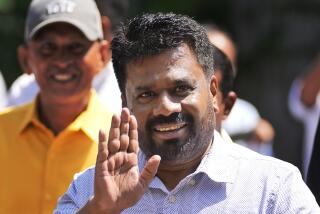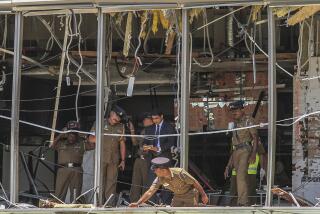New Hope in Bloody Sri Lanka : President-elect extends olive branch to rebels in seeking to end long conflict
- Share via
The savagery of Bosnia and the carnage in countries like Rwanda and Somalia make it easy to forget the troubles of the island nation of Sri Lanka. Yet in that country, off the southern tip of India, a decade of ethnic clashes has killed more than 35,000 people.
This week’s election of Prime Minister Chandrika Kumaratunga as president offers hope that the slaughter will end. Kumaratunga has wisely and courageously vowed to “forge ahead” with the peace process, probably in the form of peace talks with Tamil guerrillas, who started the warfare in an attempt to carve out an independent nation in the north.
Her foe in the election, Srima Dissanayake, campaigned on a platform of no talks. That was understandable; Dissanayake’s husband, his party’s presidential candidate, was assassinated last month. Police blamed Tamil guerrillas for the suicide bomb attack, which also killed 50 others.
Dissanayake’s United National Party used mob violence and murder to help it maintain power for 17 years, during which the nation formerly known as Ceylon went steadily downhill. Once an outpost of prosperity and literacy in South Asia, Sri Lanka was overdue for a change of government. Voters, recognizing this, made Kumaratunga prime minister in August.
Kumaratunga herself is no stranger to violence. Her father was prime minister until his assassination in 1959 by a dissident Buddhist monk; six years ago Sinhalese militants killed her politician husband out of anger over the olive branches he and she had extended to the Tamils.
The new president is the first national officeholder in years who has reached out to minorities. She will have to walk a tightrope between the Tamils, who make up only a small minority of the nation of 17 million people, and the majority Sinhalese. Religion complicates the issue, with the Tamils mostly Hindu and the Sinhalese mostly Buddhist.
For their part, the Tamil guerrillas should recognize that this is their best chance in years to stanch the blood, and perhaps to gain some autonomy, if not independence, after a decade of tragedy.
More to Read
Sign up for Essential California
The most important California stories and recommendations in your inbox every morning.
You may occasionally receive promotional content from the Los Angeles Times.










